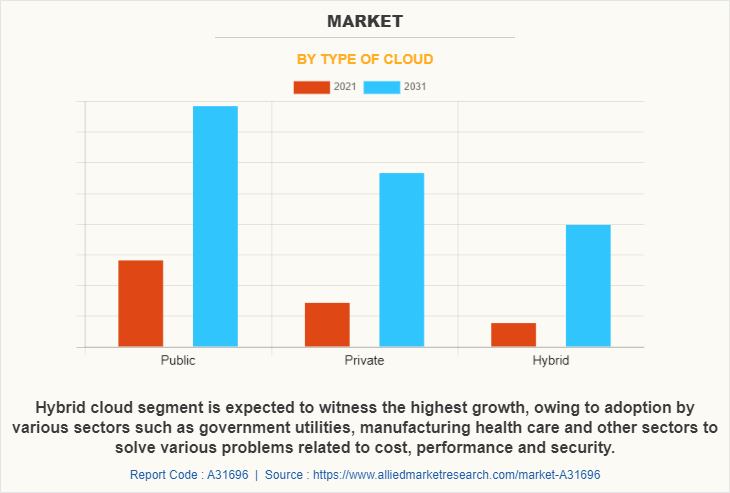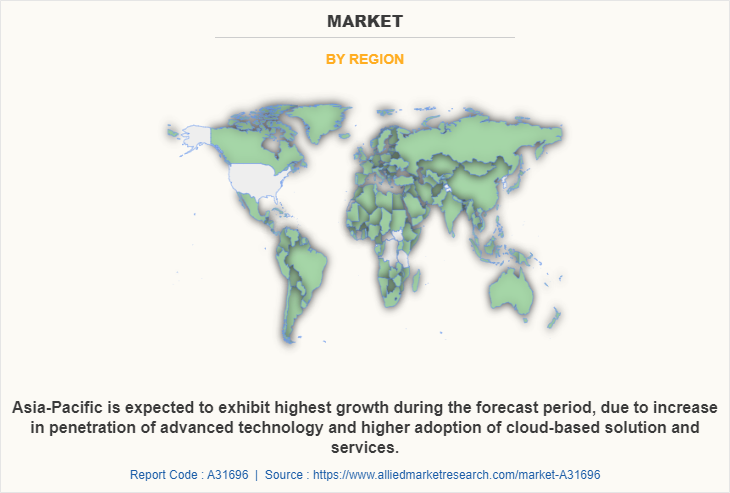Marketing Cloud Platform Market Overview
The global marketing cloud platform market was valued at $10 billion in 2021, and is projected to reach $34.9 billion by 2031, growing at a CAGR of 13.7% from 2022 to 2031.
Marketing cloud offers a comprehensive digital marketing platform covering a diverse array of capabilities and solutions. These include social media, content creation, web personalization, data analysis, content management and advertising. The aim of a marketing cloud platform is to manage marketing activities more efficiently, thus provide the lucrative opportunities for the market growth. The most important factor, which is driving the global marketing cloud platform market growth, is the cost effectiveness. The other factor includes all the functional capabilities which boost up the business performances of the organizations. In addition, upsurge in demand for marketing cloud platform due to COVID-19 pandemic boosts the growth of the market.

Furthermore, the opportunity for marketing cloud platform market lies in the developing economies as they have gradually grown to become the hub for IT services, one of the largest target segments for marketing cloud platform. In addition, substantial increase in the number of small and medium enterprises is expected to lead to increased adoption of marketing cloud platform in such regions. On the contrary, the developing economies are expected to adopt the marketing cloud technology due to cost benefits which offers growth opportunities for the market. Another opportunity that major market players can tap into is the need for ERP as software solution which can be used in the healthcare sector to keep a track on patient records, thus, likely to drive the growth of the market.
Segment Review
The marketing cloud platform market is segmented on the basis of component, cloud type, marketing function, organization size, industry vertical, and region. By component, it is bifurcated into platform and services. By cloud type, it is divided into private, public and hybrid. On the basis of marketing function, it is categorized into marketing content and automation, marketing engagement, marketing analytics, marketing interaction and others. By organizational size, the market is segmented into small & medium-sized enterprises and large enterprises. By industry vertical, the market is categorized into retail and e-commerce, IT and telecommunication, BFSI, media and entertainment, healthcare, travel and hospitality and others. Region wise, it is analyzed across North America, Europe, Asia-Pacific and LAMEA.

On the basis of cloud type, the global marketing cloud platform market share was dominated by the public cloud segment in 2021 and is expected to maintain its dominance in the upcoming years. This is mainly attributed to the fact that the public deployment mode is the most accepted deployment model due to the easy access and low costs. However, hybrid cloud segment is expected to witness the highest growth, owing to adopted by the various sectors such as government utilities, manufacturing and health care to solve various problems related to cost, performance and security. Thus, are willing to adopt the hybrid due to its benefits.

Depending on the region, the North America dominated the market share in 2021 for the marketing cloud platform market. The increase in usage of marketing cloud platform in BFSI, retail, healthcare and other sectors to improve businesses and the customer experience are anticipated to provide the lucrative growth opportunities for the market in North America. However, Asia-Pacific is expected to exhibit highest growth during the forecast period. This is attributed to increase in penetration of advanced technology and higher adoption of cloud-based solution and services, propel the growth of the market in this region.
Top Impacting Factors
Increase in adoption of marketing cloud platform across enterprises
Last few decades have shown a tremendous rise in entrepreneurs with their small and medium organizations. There is a great demand of marketing cloud computing services due to the advantages offered such as cost cutting and business flexibility, which proves to be a boon to the startup businesses. The need for marketing cloud computing services is rising due to the growth of these enterprises including SMEs. Most of the IT enterprises need the advanced technology of marketing cloud computing services to flourish their businesses and leave their footprints in various geographies.
The marketing cloud platform offer various functional benefits and actively participate in the overall growth of the marketing cloud platform market. The functional benefits offered by cloud computing are no upgrading and instillation functions, operative use of IT staff and distributed resources. Eliminations of having regular upgrades and installation prove beneficial to the user as the responsibility of upgrade, patch, add on installations remains with the service provider. Use of cloud-based marketing services reduces the workload of the IT staff in maintaining IT infrastructure and helps them to work in other projects making more operative use of IT staff. Moreover, the resources are evenly distributed and can be used by every individual in the cloud. The use of cloud-based marketing services also provides recovery and backup solutions, which improve the agility of the business.
Enterprises embrace multi-cloud environments
Multi-cloud environments are opted by organizations when they want to leverage the specific benefits of each cloud environment while retaining the ownership and maintenance of the cloud environment centrally. In addition to using public, private, or hybrid environments, multi-cloud environments could also include the use of various flavors of cloud like SaaS, IaaS, PaaS, etc. For instance, an organization could use SaaS applications for its operation while using IaaS to manage its IT infrastructure. Evidently, such a combination of various cloud environments allows enterprises to assemble the best of cloud capabilities to achieve their organizational objectives.
On the contrary, public cloud is a cloud offering where the IT infrastructure is owned and managed by a third-party vendor. Users can use the resources and pay for it based on usage. Public cloud environments are shared with multiple organizations but ensure that no organizational data is accessible to other organizations in the same public cloud. It is a cost-effective way to store data and applications. Further, public cloud gives businesses the much-needed agility and speed-to-market that on-premises services lack. It does not require any physical infrastructure, to begin with, and hence enables businesses to quickly become cloud-first organizations. Such advantageous propel the growth of the marketing cloud platform market trends.
Rapid changes in business model software due to geographical expansion of the businesses
Business is going through rapid change due to changing demand of customer, strict regulations and economical changes among others. To study changing demands of customers, it is essential for the company to constantly interaction with customers, which is possible through implementation of marketing cloud platform. Businesses are now engaged in the enhancement of productivity and different business operation. Thus, providing companies with ample growth opportunity to cater to the changing business models. Organizations are expanding their geographical presence through acquisition and partnership. Integration and collaboration of business is possible through implementation of marketing cloud platform, which enable them to centralize their business operations. Synchronization and collaboration of business documents and their rapid sharing is also possible by the use of marketing cloud-based technology. Geographical expansion of companies propels the growth the marketing cloud platform market during the forecast period.
COVID-19 Impact Analysis
The current estimation of 2031 is projected to be higher than pre-COVID-19 estimates. The COVID-19 outbreak has considerably boosted the marketing cloud platform market forecast due to accelerating demand for the cloud to support several crucial digital solutions such as e-commerce and remote work, as well as entertainment platforms such as online gaming and video streaming.
Moreover, the pandemic has introduced considerable challenges for companies which are trying to execute key processes, report accurately with data spread over multiple locations, operate complex systems, and efficiently communicate with teammates; particularly where there don’t have the infrastructure for such processes. Hence, a greater number of companies are investing in marketing cloud platform. Marketing cloud platform provides the limitless scalability and continual enhancement of functionality, which are critical in accomplishing digital transformation, which boost the growth of the market.
For instance, Microsoft launched the global skills program initiative aimed at bringing more digital skills to 25 million people worldwide by the end of the year. This initiative brings together every part of the company, combining existing and new resources from LinkedIn, GitHub, and Microsoft. Moreover, due to COVID-19, end user such as BFSI, government industry vertical, retail & ecommerce and others adopted digitalization for smooth operations, which led to wide adoption of marketing cloud platform market post pandemic.
In addition, the rapid growth in revenue of marketing cloud platform providers has been observed during the pandemic. For instance, September 2020. Accenture launched the Accenture Cloud First services. Accenture Cloud First is a new multi-service group of 70,000 cloud professionals that brings together the full power and breadth of Accenture’s industry and technology capabilities, ecosystem partnerships, and deep commitment to learning and upskilling clients’ employees and to responsible business, with the singular focus of enabling organizations to move to the cloud with greater speed and achieve greater value for all their stakeholders during the pandemic period.
Furthermore, Accenture Interactive’s leading experience design skills; and insights from the company’s unmatched experience in modernizing and operating large IT estates and key business processes across finance, HR, marketing, supply chain and specific industries for leading global companies. This operational experience at scale is critical to ensuring companies realize value from their cloud and digital transformation. Such enhancement will create numerous opportunities for the marketing cloud platform industry growth during the forecast period.
Key Benefits for Stakeholders
The study provides an in-depth marketing cloud platform market analysis along with the current trends and future estimations to elucidate the imminent investment pockets.
Information about key drivers, restrains, and opportunities and their impact analysis on the marketing cloud platform market size is provided in the report.
The Porter’s five forces analysis illustrates the potency of buyers and suppliers operating in the marketing cloud platform industry.
The quantitative analysis of the global market for the period 2021–2031 is provided to determine the marketing cloud platform market potential.
Marketing Cloud Platform Market Report Highlights
| Aspects | Details |
| Market Size By 2031 | USD 34.9 billion |
| Growth Rate | CAGR of 13.7% |
| Forecast period | 2021 - 2031 |
| Report Pages | 254 |
| By Component |
|
| By Type of Cloud |
|
| By Marketing Function |
|
| By Organization Size |
|
| By Industry Vertical |
|
| By Region |
|
| Key Market Players | CM Group, Adobe, Oracle Corporation, Maropost, IBM Corporation, Salesforce, Inc., Teradata Corporation, The Nielsen Company (US), LLC, Acquia, Inc., SAP SE |
Analyst Review
According to the CXOs of leading companies, the marketing cloud platform market is going through enormous transformation and growth. As customer demand and expectations are evolving with rapid pace of digitalization, legacy infrastructures are making it difficult to accommodate these customer needs. This has compelled industries to adopt emerging technological change in its operating environment. Cloud has evolved to be the dominant technology in the race of technological changes. Hence, increase in adoption of cloud-based products is expected to boost the global market at an exponentially high rate in the coming years.
Next-generation digital businesses are leveraging cloud capabilities and preparing for a future of integrated solutions. These include vendor selection, migration tactics, process optimization, cloud security, multi-cloud environments, hybrid & digital infrastructures, data center outsourcing strategies, cloud optimization, cloud computing, PaaS, IaaS, SaaS, and others. Furthermore, extreme agility and accessibility capabilities of a cloud dominate the marketing cloud platform market. The marketing cloud platform is a great option for both corporation and individuals due to its security, dependability, and performance enhancements. For instance, studies suggest that public cloud adoption is anticipated to continue to accelerate in 2022 and beyond. This is partly due to the reason that the cloud providers have data centers with advanced security systems, which ensure maximum data security. Enterprises cannot deploy on their own due to limited budget and resource availability. Moreover, start-ups that do not have the deep pockets to invest in private clouds rely on public clouds to build their businesses.
Furthermore, major marketing cloud platform providers around the globe experienced year-over-year revenue growth due to the pandemic. The pandemic-driven restrictions accelerated demand for the marketing cloud platform to support crucial digital solutions such as remote work and e-commerce, as well as entertainment platforms such as online gaming and video streaming.
The CXOs further added that the marketing cloud platform market is competitive and comprises number of regional and global vendors competing based on factors such as cost of solution & services, reliability, and support services. The growth of the market is impacted by rapid advances in the marketing cloud platform offerings, whereas the vendor performance is impacted by COVID-19 conditions and industry development.
Owing to the competition, vendors operating in the market are offering advanced marketing cloud platform products and services to improve the experience of their customers. Such enhancement provides lucrative opportunities for market growth in the coming years.
The Marketing Cloud Platform Market Expected to reach $34883.72 million by 2031.
Factor such as growing digitalization transformation initiative due to COVID-19 outbreak, thus drives the growth of the market. In addition, increase in adoption of marketing cloud platform across enterprises and emergence of social networking platforms strengthens the growth of the market for future.
The North America is the largest market for Marketing Cloud Platform Market.
The key growth strategies for Marketing Cloud Platform include product portfolio expansion, acquisition, partnership, merger, and collaboration.
Adobe, Acquia, Inc., IBM Corporation, Oracle Corporation, Salesforce, Inc., SAP SE, Teradata Corporation, The Nielson Company (US), LLC. and others
Loading Table Of Content...



